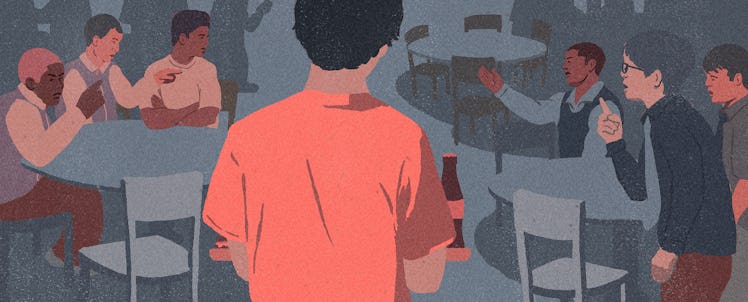Carl Hoffman: A Letter to My Son About Tight-Knit Groups and Tribal Tendencies
That belonging to a group can make you more powerful than going on your own is an immensely comforting concept. It's also wildly dangerous.

Fatherly’s Letters to Boys project offers boys (and the men raising them) guidance in the form of heartfelt advice given generously by great men who show us how to take that crucial first step in confronting seemingly unsolvable issues — by offering honest words. Read all the letters here, or share your own.
Dear Max,
Remember that time I called you and your sisters on the satellite phone to wish you a happy Thanksgiving and you said, “Dad, are you okay? You sound crazy!”
I was talking so fast, so breathlessly, because the moment was so bizarre. It was 3 in the morning, and I was deep within a 10,000-square-mile roadless swamp among a tribe of former headhunters and cannibals, their village without electricity, internet, plumbing, even a single store. Yet your voices were as clear as if you were standing next to me, and the contrast was too much to take in.
You know the outlines, of course, but there’s something deeper I want to say about that experience, something that’s especially true for boys and men.
Those days and nights I spent living with the Asmat people in New Guinea were the fulfillment of a dream I’ve had since I was even younger than you. I’d hungered for that feeling of belonging to a tight-knit group ever since I can remember: The cool kids in sixth grade who flattered me with acceptance, but then expected me to shoplift or smoke, expectations that led to violence between us. The Cub Scout troop, anchored in the local parochial school, in which we played full-contact football and had yelling contests, both of which repelled me. I wanted to belong, and I never could. I was always the outsider.
Perhaps it’s no surprise, then, that as an adult, as a journalist, I found myself attracted to the purest of tribal people. Walking through Malaysian Borneo with the last family of hunter-gatherer Penan nomads. Eating the raw marrow of a reindeer femur with the last Oroki herders in Siberian Russia. Or the wildest adventure of all, the weeks spent in that Asmat village from which I called you that Thanksgiving.
I fantasized about becoming Asmat as I sat listening to them sing for 24 hours straight in their village, creating a bridge, they told me, between them and the spirits. They had a oneness that night that I could see, feel, and that I yearned to be part of. Still, I recoiled.
For I knew I could never give up my own autonomy. And there was something deeply sad about the Asmat men. They stared into space smoking endless cigarettes and had little to do, except for the occasional celebration. They were relics, vestiges, warriors without a war to fight. For untold generations everything that made them men had been based on violence against their neighbors, against outsiders. Only 40 years before, adolescent boys there became men with the fresh skulls of head-hunted neighbors, and every death was reciprocated with another raid, another murder, and the rituals that accompanied it.
Now that that was gone, head-hunting outlawed, they were listless, adrift, united in their tribalism and community still, but with no larger purpose and little hope of change and no knowledge of the outside world.
“Find Your Tribe” is a popular sentiment these days, and it’s well-intended. There is nothing more valuable and fulfilling than finding good friends who let you be yourself and will support you when you need them to. But take it from me, the tribe is a dangerous concept from a different era. It is the kind of thinking that leads to gangs, problem fraternities, gated communities, and nationalism. These offer identity by pushing others outside the circle.
And it is within the confines of those circles and in defense of them that individuals surrender their autonomy and humanity to the tribe. Racism, misogyny, and violence often erupt. The group assumes power the man himself doesn’t feel.
Max, you know how much I’ve loved traveling to the furthest corners of the planet, how fun it is to tell you stories of those journeys and those tribal people. But the funny thing is, it’s because I belong to no tribe that I have been able to go so far, so deeply, into so many different tribes, and to observe so freely. It’s why I’ve pushed you to cultivate your curiosity, your wonder, and your openness to new ideas, people, and places. It’s why I tell you now, don’t bother to find your tribe.
Love,
Dad
Carl Hoffman is a father of three young adults and journalist and author who has traveled on assignment to eighty countries. His books include Savage Harvest: A Tale of Cannibals, Colonialism, and Michael Rockefeller’s Tragic Quest, The Lunatic Express, and The Last Wild Men of Borneo.
This article was originally published on